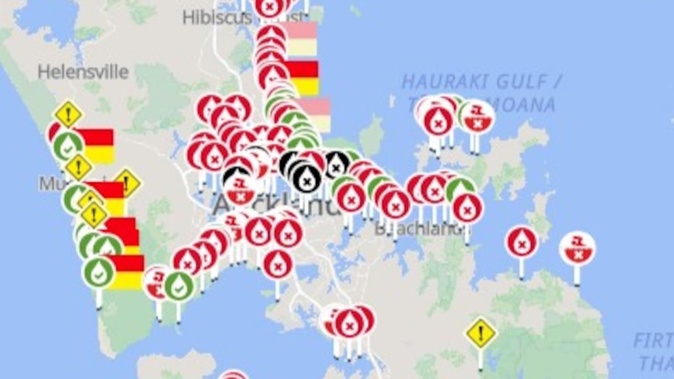
- Most Auckland beaches are unsafe for swimming due to suspected wastewater contamination following a recent deluge.
- Safeswim has flagged about 60 beaches with red and seven with black warnings.
- Contaminated water poses health risks, including gastroenteritis and more serious diseases.
Most of Auckland’s beaches may have been contaminated with wastewater after the recent atmospheric river swept through the country.
A sea of red and black flags on the Safeswim website show it is unsafe to swim at a majority of places around the city and beyond due to poor water quality.
The water quality site has flagged multiple beaches from the North Shore to Manukau Harbour, about 60 with red flags advising not to swim and seven with black flags warning that nobody should swim there due to severe risk.
“A wastewater overflow has been detected in the area. Do not swim here as untreated wastewater may be present,” reads the warning on many of the black-flagged beaches, most of which are in the inner harbour.
 Safeswim's water quality map shows most of Auckland's beaches aren't safe for swimming in after recent rain.
Safeswim's water quality map shows most of Auckland's beaches aren't safe for swimming in after recent rain.
According to Watercare, “a wastewater (sewage) overflow happens when wastewater spills out from gully traps, manholes, overflow points or pump stations.
“This overflow is mainly water, but also contains about 1% human waste, food scraps, fats, debris and trade waste.
“When untreated wastewater enters the wider environment, it can pollute property, waterways and beaches.”
An atmospheric river dumped heavy rain across several regions yesterday, causing slips, flooding, traffic woes and power cuts.
Much of the top half of the North Island was also impacted by the foul weather, with Auckland coastguard rescuers facing three-metre swells and 40-knot winds in the early hours of yesterday to pluck a woman to safety after her yacht began dragging its anchor off Tindalls Beach, on the Whangaparāoa Peninsula.
The wild weather has contributed to many of the beaches being flagged, though some already have precautionary flags in place regardless.
 Forecasters earlier warned a large weather system could bring an “atmospheric river” to New Zealand shores this week. Image / Niwa
Forecasters earlier warned a large weather system could bring an “atmospheric river” to New Zealand shores this week. Image / Niwa
Safeswim said water quality could be impacted by rain, particularly if it is heavy.
“The water at coastal beaches, and in lakes and rivers, can be contaminated with human or animal faeces (poo) due to pollution from stormwater and wastewater systems. Stormwater can contain faecal contamination from humans, but also wild (birds, possums) and domestic animals (dogs, sheep, cows),” the website said.
“The presence of faeces in recreational waters means that microbial pathogens that are harmful to humans may be present, such as viruses, bacteria and protozoa. These pathogens pose a health hazard to people who enter the water.
“They can cause gastroenteritis, respiratory illness, ear and skin infections, as well as more serious diseases, such as hepatitis A, giardiasis, cryptosporidiosis, campylobacteriosis and salmonellosis.”
Safeswim water quality models predict when levels of Faecal Indicator Bacteria breach national guidelines for swimming.
It advises people against swimming in contaminated water.
Safeswim said its overall accuracy has been estimated to be between 86% - 90% over the last five summers.
Take your Radio, Podcasts and Music with you









